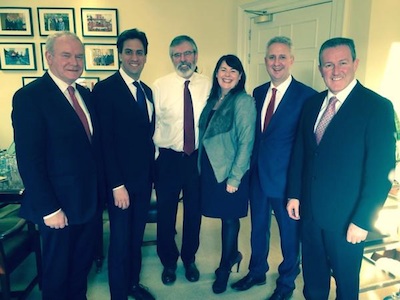
The British Labour Party has denied claims that it has tried to persuade Sinn Fein to take up its five seats at Westminster to collectively oust the Conservatives and put Labour leader Ed Miliband into Number 10.
Polls suggest there is a strong likelihood neither Labour nor the Conservatives will have an overall majority at Westminster. Speculation around the May general election has involved looking at a number of potential coalition governments, comprising one or more the main parties in combination with the smaller ‘regional’ parties.
Sinn Fein has insisted it will not end its policy of abstentionism at the London parliament, even if offered a deal.
Republicans have traditionally rejected elected bodies which claim jurisdiction over parts of Ireland other than the original 32-County Dail Eireann. Following the 1986 split, Sinn Fein recognised the legitimacy of the 26-County parliament and in 1998, the Six County Assembly. However, taking its seats in Westminster is still seen as a bridge too far for the party.
According to West Tyrone MP Pat Doherty, Labour has made a number of approaches to Sinn Fein about the possibility of a post-May 7 agreement.
“They bring it up quite bluntly and it’s always dealt with in the same way,” he said.
“Let me reassure you we are not going into the House of Commons or indeed the House of Lords.”
MILIBAND SAYS MAYBE
When asked if he would do a deal with Irish or Scottish nationalists if Labour fails to secure an overall majority, Mr Miliband said: “I have only one focus, which is a majority Labour government.”
Pressed again on the possibility of any deal, he continued to hedge. He said: “I couldn’t be clearer ... we don’t need, we don’t want and we’re not planning for that, and that is my position too.”
The speculation that Labour tried to strike a deal with Sinn Fein came in the aftermath of a meeting between the two parties at Stormont last week during Mr Miliband’s visit to Belfast.
Commentators suggested that if Sinn Fein’s five seats really can affect the balance of power in Westminster, a way might be found for them to use their votes to keep a potential alliance of Tories and unionists out of power.
Peter Kellner, head of the YouGov polling company, said the likelihood of a close election meant that such a previously unthinkable alliance may now be possible.
Conservatives sought to capitalise on tabloid newspaper reports, producing an online poster featuring Mr Miliband with Gerry Adams and Scottish National Party (SNP) leader Alex Salmond.
Under the headline ‘Your Worst Nightmare Just Got Even Worse’, the poster warned: “The SNP and Sinn Fein propping up Ed Miliband? Chaos for Britain.”
Responding to the suggestion, Francie Molloy, Sinn Fein MP for Mid Ulster, said: “Gerry Adams said it last week, I repeat it today - Sinn Fein will not be taking their seats in British House of Commons no matter what the result of the next general election in May.”
DEBATE FURORE
Meanwhile, the DUP has continued to express anger at a decision of the BBC to refuse to allow the DUP or Sinn Fein to take part in televised leaders’ debates ahead of the May election.
Tory leader David Cameron also raised the question of why the north’s parties were not included, saying “it doesn’t quite make sense”.
Mr Miliband has committed himself to taking part in the debates, whatever format is chosen and whether or not Mr Cameron turns up. On Tuesday, he accused the PM of “wriggling and wriggling to try to get out of these debates”.
Responding to the unionist criticism, the director general of the BBC, Lord Hall, said the party political structure in the Six Counties is “different from that of the rest of the UK” and the position of the DUP was not directly comparable with that of the SNP and Plaid Cymru, parties in Scotland and Wales which will be taking part.
If the DUP was invited to take part, impartiality rules would require all of the north’s parties to be given a spot, Lord Hall wrote.
DUP leader and First Minister Peter Robinson described the BBC response as “irrational”.
![[Irish Republican News]](https://republican-news.org/graphics/title_gifs/rn.gif)
![[Irish Republican News]](https://republican-news.org/graphics/title_gifs/harp.gif)

